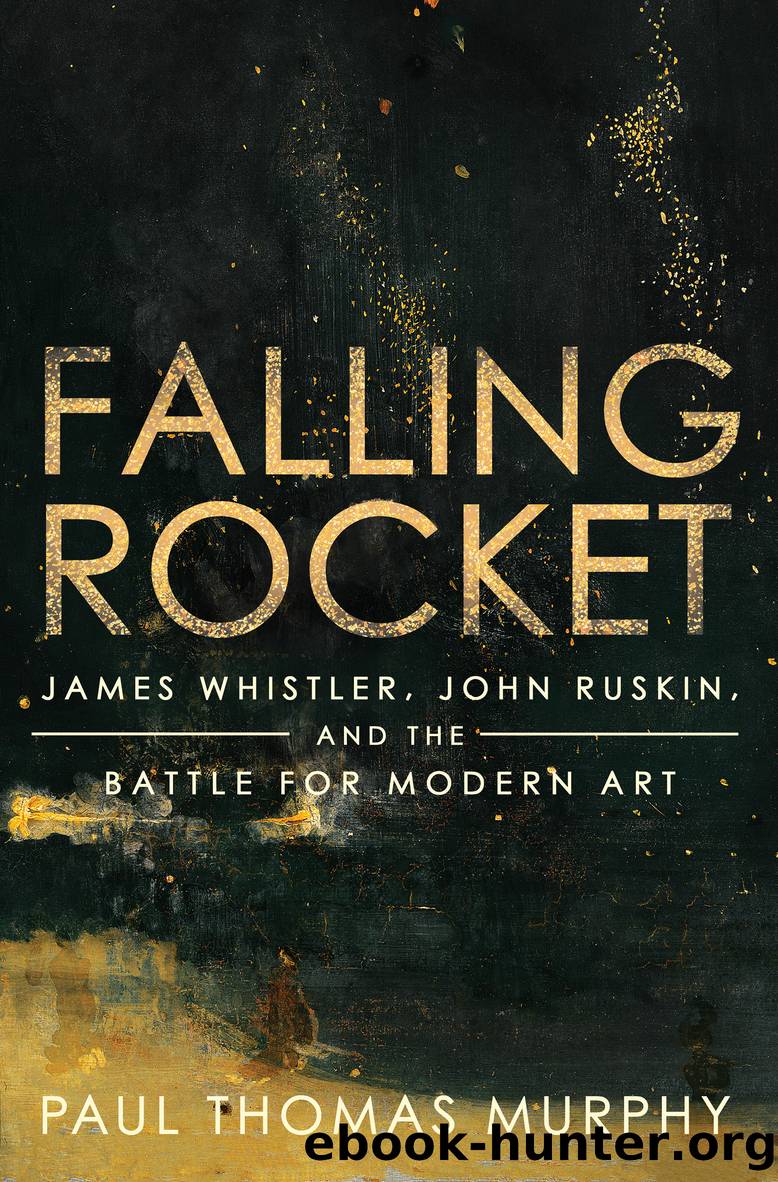Falling Rocket by Paul Thomas Murphy

Author:Paul Thomas Murphy
Language: eng
Format: epub
Publisher: Pegasus Books
Published: 2023-12-05T00:00:00+00:00
Having in this way proclaimed the great danger that his public posed to him with its doubt and misunderstanding, Ruskin then courted that danger all over again by recommencing his thunderings, beginning with a denunciation of James Anthony Froude, his acquaintance and a fellow disciple of Carlyle, for his progressive view of history so opposed to Ruskinâs regressive one, and by shifting to a lengthy passage by the French politician Jules Simon detailing stomach-turning poverty in the industrial districts of northern France. This Fors letter appeared in March.
That winter the plague cloud particularly beset him. January 4, 1880: âThe wantâfor a whole winterâof one pure sunrise! unbelievable and horribleâbut fact. How we bear it is the wonderâ.â January 9: âThe hell-fog unbroken⦠fretful and despairing and canât go on with anythingâbut pull my lips, and stare at the pitch cloudâand wonder if itâs the Devilâor the Bishop of Manchester or me, that itâs sent for.â February 29: âThe Abyss of darkness in the whole sky today, without fogâis quite awful.â March 12: âBut the curse on the sky is my chief plagueâIf only spring were spring! But itâs too hard on me, this devil in the wind and clouds and light.â
During this dark time Ruskin took dark pleasure in news from Glasgow. At the end of January 1880, a painting, A Symphonie in Blue and White, described in the newspapers not only as Whistlerâs work but as âthe Cause Célebreâ of Whistler v. Ruskin, was auctioned off and fetched a paltry twelve pounds and ten shillings. The painting was almost certainly a fakeâand certainly not the Falling Rocket. If Whistler, then in Venice, learned of this sale, he would certainly have spoken up. Ruskin, too, should have known better. But when a correspondent sent him the details, Ruskin believed the painting he had condemned had in effect been condemned again. He was gleeful: âmore pleased⦠than perhaps some of my friends would think it virtuous to be.â Replying to his correspondent, Ruskin could not disguise his absolute disdain for Whistler:
the principal annoyance in the whole matter to me was the way my best friends wrote as if Mr. W. was really something of a dangerous match and antagonistâand their expecting me to answer or debate with himâso that I need not expect my friends to sympathise with any dignities of mine; but they might expect me to express virtuous forgiveness and the like, of which there is no shadow (or light) whatsoever in my mind, but entire satisfaction in all that you tell me in its bearings.
Download
This site does not store any files on its server. We only index and link to content provided by other sites. Please contact the content providers to delete copyright contents if any and email us, we'll remove relevant links or contents immediately.
The Social Psychology of Inequality by Unknown(2312)
The Plant Paradox by Dr. Steven R. Gundry M.D(2041)
The Writing on the Wall by Anselm Jappe(1759)
Working for Yourself by J.D. (Nolo) Stephen Fishman(1478)
Every Landlord's Legal Guide by Janet Portman & Stewart Marcia & Ralph Warner(1325)
The First 20 Hours: How to Learn Anything ... Fast by Kaufman Josh(1304)
ADHD on Trial by Michael Gordon(1241)
Decisive by Chip Heath(1201)
Drafting Contracts: How and Why Lawyers Do What They Do, Second Edition by Stark Tina L(1172)
Working for Yourself by Stephen Fishman J.D. (Nolo)(1139)
The Economist Aug 8th 2015 by The Economist(1123)
Restitution by Restitution(1115)
The Economist Aug 29th 2015 by The Economist(1098)
A Practical Guide to International Arbitration in London by Hilary Heilbron(1084)
The Lord of the Rings: The Fellowship of the Ring, the Two Towers, the Return of the King by J. R. R. Tolkien(1083)
Intellectual Property Strategy by John Palfrey(1082)
Collusion by Luke Harding(1045)
Persuasion by Owner(1012)
Chapter 1 by Owner(950)
